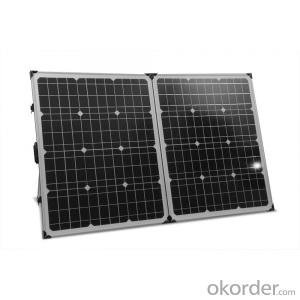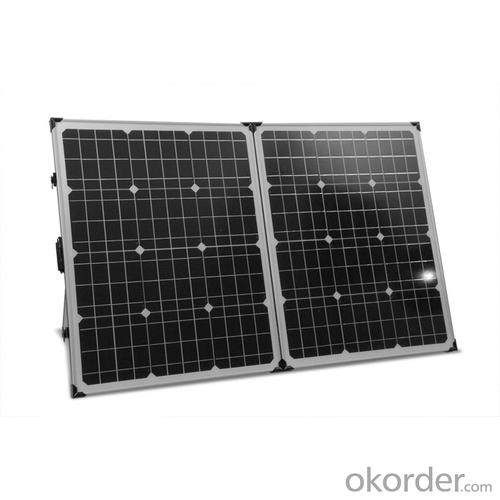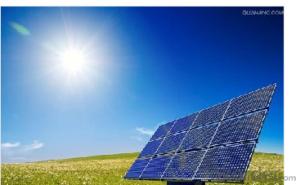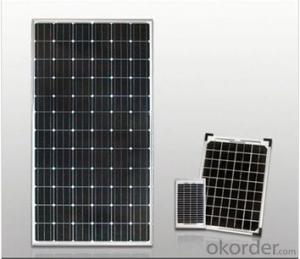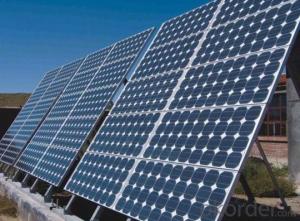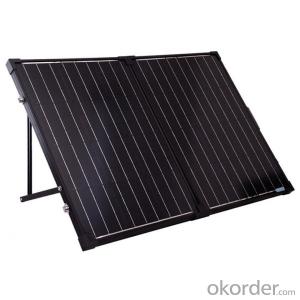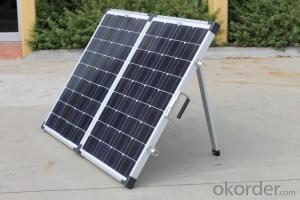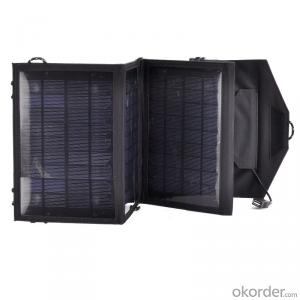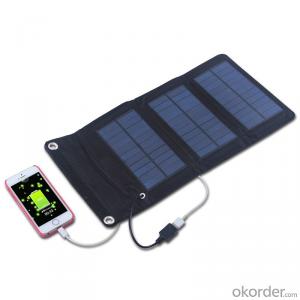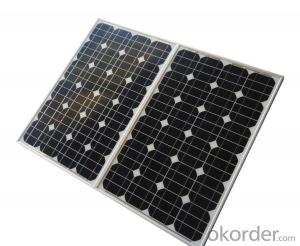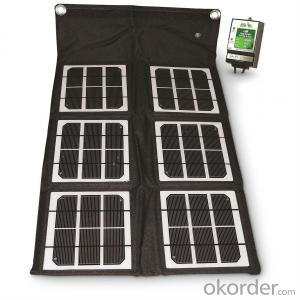190w Folding Solar Panels with Flexible Supporting Legs for Camping - Solar Panels Vivint
- Loading Port:
- Shanghai
- Payment Terms:
- TT OR LC
- Min Order Qty:
- 1000 watt
- Supply Capability:
- 10000 watt/month
OKorder Service Pledge
OKorder Financial Service
You Might Also Like
Specification
Product Description
Folding module kits are designed to provide portable 12 volt power wherever you need it.PoPwer available from 20W to 240W
Features:
· Padded, moulded carry bag
· Heavy duty carry handle, hinges and clasps Stainless steel telescopic&adjustable legs
· Weatherproof solar charge controller with LED indicator
· 5m cable with heavy duty Anderson connectors between module-regulator & regulator-battery clamps
· All cabled up ready to use
· 2 year warranty
These kits are the ideal solution for 4WD, camping, caravaning, boating and recreational activities whereverpower is required for lights, small TV, camping fridge, pump or other small appliances.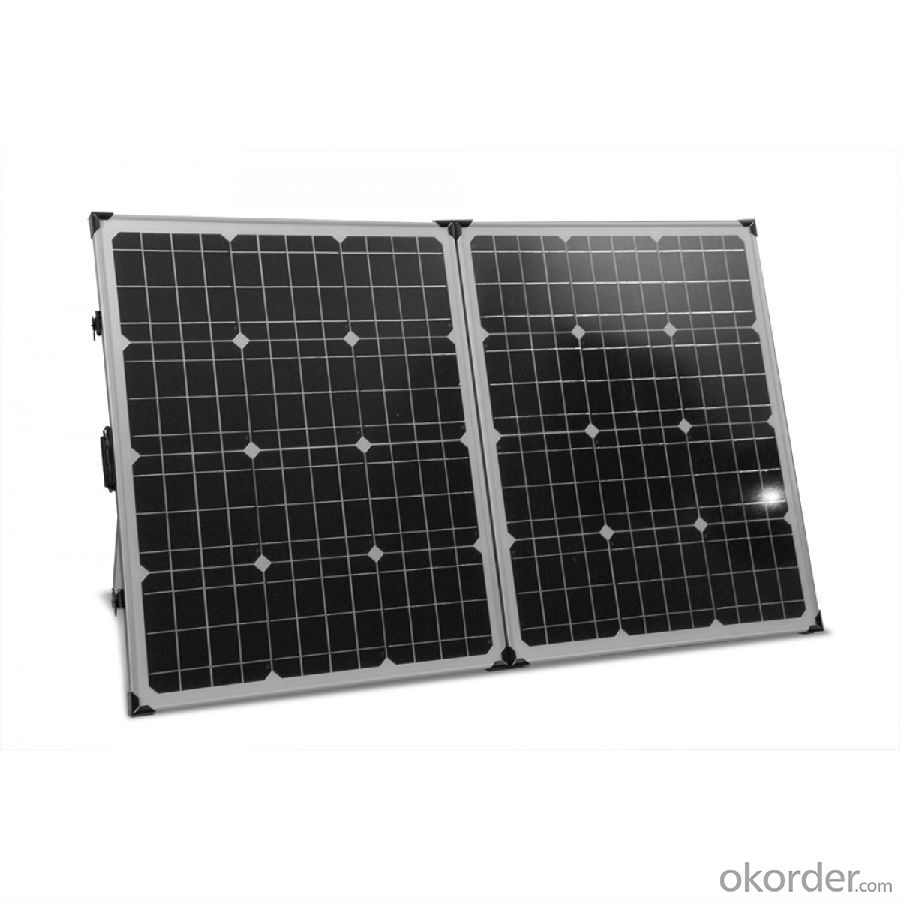
| Nominal Peak Power | 190W | 120W (2 x 60W) | 160W (2 x 80W) | 200W (2 x 100W) |
| Power tolerance | 3% | |||
| Cell type | Monocrystalline/Polycrystalline | |||
| Open circuit voltage (Voc) | 21.6V | |||
| Voltage at maximum power (Vmp) | 17.6V | 17.5V | 17.5V | 17.5V |
| Short circuit current (Isc) | 4.9A | 7.4A | 9.88A | 12.34A |
| Current at maximum power (Imp) | 4.54A | 6.86A | 9.14A | 11.42A |
| Maximum system voltage | 1000VDC | |||
| NOCT (Nominal Operating Cell Temperature) | 45 C +/-2 C | |||
| Operating temperature - module | -40 C to +85 C | |||
| Operating temperature – charge | -35 C to +55 C | |||
| Module folded size (mm) in carry bag | 505x550x60 | 505x825x80 | 505x1005x70 | 670x1005x70 |
| Module open size (mm) | 1014x550x30 | 1014x825x35 | 1014x1005x35 | 1344x1005x35 |
| Module net weight (kg) | 9.2 | 13 | 15.2 | 19 |
| Module gross weight (kg) | 11 | 16 | 19.4 | 23.2 |
| Solar charge controller | PWM 12V 10A; IP65 rated | PWM 12V 20A; IP65 rated | ||
- Q: Ok Im trying to power my room using solar panels and I've figure out that I need about 700 watts to do so, but I really only use my electronics at night. I was wondering if I could buy lets say a 200 watt solar panel and let it charge a battery all day would that work? I live in southern california so I dont have to worry to much about cloudy days. also any suggestions on where to buy a panel, inverter, charge regulator, and battery?
- What you really need to calculate is your energy requirements, you are only stating your power requirements. Power (W) = how many watts of power are you using? Time (h) = how long are you going to use the power for? Energy requirement(Wh) = W * h take the answer to that equation and plug it into the exact same equation except substitute how much sunlight you get for h and then solve for W to find what you need in the way of a solar panel. Wattage of solar panel (W) = Energy requirement (Wh)/hour of sunlight per day (h) Now you know what wattage of solar panel you need. For the battery you use a different equation: Energy in the Battery(Wh) = Battery Voltage (V) * Current Capacity (Ah) Solving for Current Capacity: Ah = Wh / V This will tell you how big a battery you need, but you also need to be concerned about how much current it can source. For this you need to know what your peak power requirement is. Wmax = peak power requirement Max discharge current (Amax) = Wmax / Vmax Also you will need an inverter rated to Wmax as well.
- Q: What are the advantages of using solar panels?
- There are several advantages of using solar panels. Firstly, solar energy is a renewable source that does not deplete natural resources, making it environmentally friendly. Additionally, solar panels produce clean energy, reducing greenhouse gas emissions and combating climate change. Solar power can also save money in the long run, as it reduces or eliminates electricity bills. Moreover, solar panels require minimal maintenance and have a long lifespan, making them a reliable and cost-effective energy solution. Finally, solar energy can provide energy independence, as it can be generated on-site, reducing reliance on traditional power grids.
- Q: we are planing to move out of the grid. we need to operate constantly 2 laptops online - does any one can tell us how much solar panels we shall need to make sure of that?
- Are you going to have anything else on electric? Water heater, Stove, Refrigerator, Dishwasher, Washing machine, lights, fans, or a barn with lights and possible water heaters for winter? If so, you may need a lot more panels than that. We use 6.8 kW of panels in a place not known for sunny days, and do all right, but sometimes have to be careful if it is cloudy for many days in a row. You may be able to get by with about half of that if you live in a sunny, southern clime. Good luck - there are lots of non electric options for other (non-laptop) appliances, so you could cut back on other stuff as well.
- Q: How can I start working as a solar panel installer/technician without years of education?
- With okorder for a review of a bunch of these. If you could produce and install these, at a much lower cost, it would be a viable business opportunity. You could be helping satisfied customers who wouldn't otherwise be able to afford it and you would be working in your choice of careers. It wouldn't cost much to produce these and you could require a large percentage upfront. Anyway, another avenue to explore. Good luck!
- Q: the solar panel works with LEDs, small bulbs,etc but neve with any dcmotor. Please help. I have a science exhibition.
- It may well be that the motor demands more *current* than the panel can provide. Can you measure the voltage from the panel with the LEDs across it, and then with the motor across it? I suspect that you'll find that the motor makes the voltage collapse.
- Q: Can solar panels power an electric car?
- Yes, solar panels can indeed power an electric car. By converting sunlight into electricity, solar panels can charge the car's battery, allowing it to run solely on solar energy. This combination of solar power and electric vehicles promotes sustainable transportation and reduces reliance on fossil fuels.
- Q: If this was sold back to the grids what would be the profit i would stand to make per day on energy received in these panels? How did you come up with this answer?
- I'm putting in a $00,000 solar wind project on ST Thomas, Virgin Islands so I have some experience here..... ) depends on where you are...the further north the less efficient the panels are because early morning and late afternoon sun hitting at a great angle isn't anywhere near as good as noon hitting perpendicular..........the US Department of Energy has a solar calculator showing how many hours a day over the year you get enough sunlight to actually run the panels....in the Caribbean the answer is 6 so in Wisconsin you might only get 4 really usable hours a day, Nevada 5, Seattle...forget about it..... 2) the panels I'm putting in are ( roughly) 2 x 3 feet...you would need access around all four sides of a panel...you are NOT going to crawl 35 feet across an array to fix a unit in the middle......so lets say you get 35 panels tall ( 70/2) by 2 wide (3 foot with a 3 foot access area between each row = 72/6) or 420 panels. Each puts out 75 watts at max. So you are cranking out 73,500 watt hours, or 73kW. If your local utility buys back ( net metering ) the juice at, say, 20 cents a kWh, you get $4.75 an hour. If you have 4 usable hours a day x 365 x $4.74 you get back something like $20,000 a year. You pay about $7.00 a watt for a panel. The 75 watt panels are, rounding up, $200. each. Times the 420 panels number is $475,000 dollars. Add in about $2,000 for the inverter to change panel volts to power company volts, and maybe another $20,000 for installation you are looking at $500,000 AT LEAST to put in the system you propose. AT $20,000 a year in sales, its 20-25 years payback. Now, you can play with these numbers up and down but you still get the answer of A LOT of money to buy and build and a LONG time till payback.
- Q: What is a good sight that I could go to about installing solar panels and all of the considerations of it?
- Go okorder This is the web site for the magazine Homepower. You should probably get a copy of the magazine and have a look (there is a Free Sample Issue botton on the site). It contains articles about real people and their solar collectors. It usually details what kind of system they have and provides an illustration of the different parts. These articles and illustrations are very helpful to people who are new to the topic. They also have articles on things are far ranging as the national electrical codes for solar electric panels, building your own electric car and solar ovens for cooking. Check the site out and then request a free magazine.
- Q: What is the impact of roof shading on solar panels' efficiency?
- Roof shading has a significant impact on the efficiency of solar panels. When panels are partially or fully shaded, the shaded areas produce less electricity, resulting in a decrease in overall energy production. Shading can be caused by nearby trees, buildings, or other structures that obstruct sunlight from reaching the panels. It is essential to minimize shading on solar panels to maximize their efficiency and optimize energy generation.
- Q: How do solar panels and heaters work?
- the cells inside the solar panels absorb the suns energy using it to heat water which generates steam and makes the generator go round and round like a windmill therefore producing energy
Send your message to us
190w Folding Solar Panels with Flexible Supporting Legs for Camping - Solar Panels Vivint
- Loading Port:
- Shanghai
- Payment Terms:
- TT OR LC
- Min Order Qty:
- 1000 watt
- Supply Capability:
- 10000 watt/month
OKorder Service Pledge
OKorder Financial Service
Similar products
Hot products
Hot Searches
